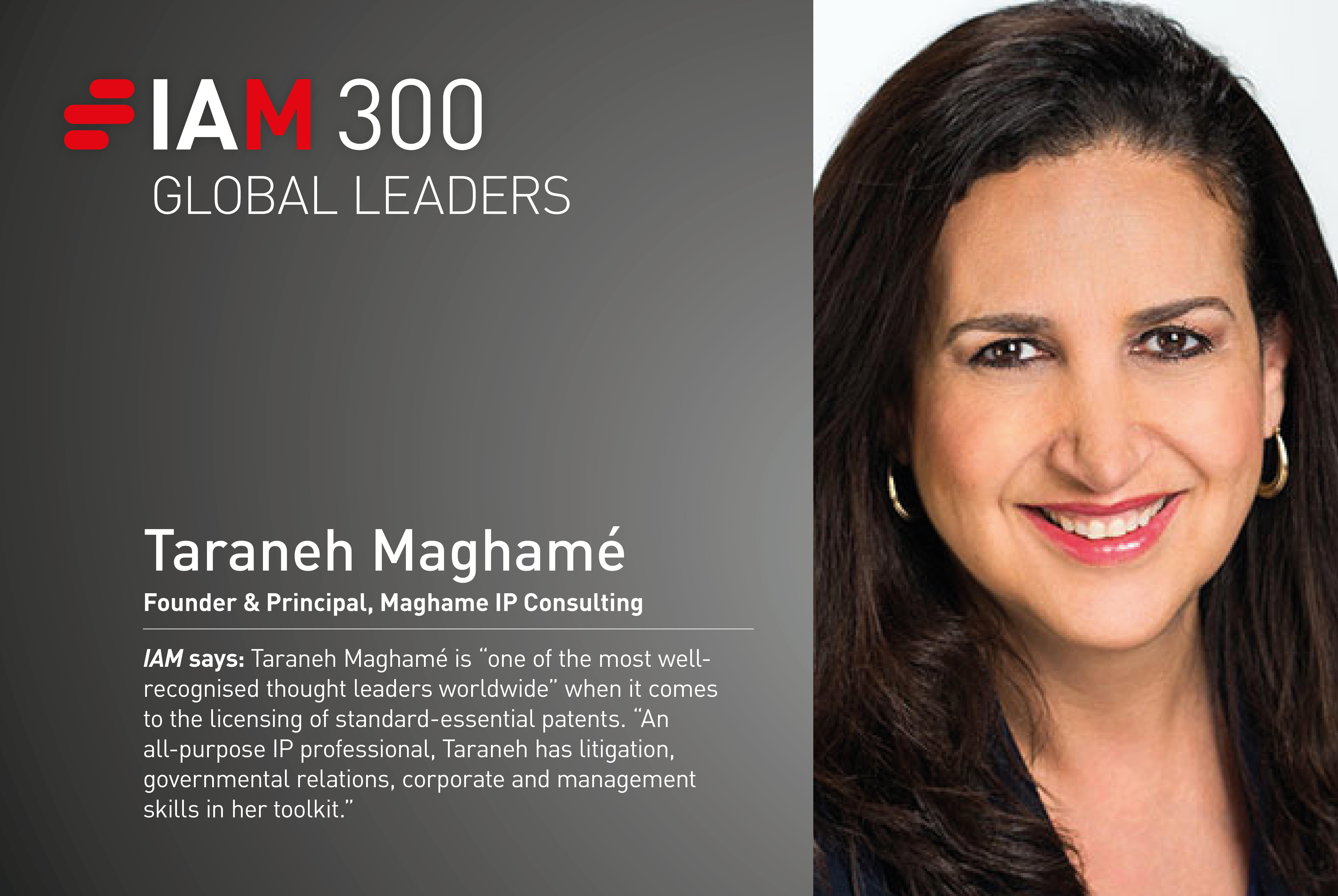Taraneh Maghamé
 What led you to start your own firm, and what advice would you give to someone considering the same?
What led you to start your own firm, and what advice would you give to someone considering the same?
After over 30 years of licensing and litigation practice at major law firms, as in-house counsel with Apple, HP and Tessera, and managing wireless licensing programmes at Via, I felt that it was time to use my unique set of skills and experiences to build my own practice. I have been very involved in patent policy matters, so being able to advise and guide my clients through those issues was something I felt was a natural next step. I especially enjoy being able to work on licensing, legal and policy matters with a range of clients in various industries. At first, the uncertainty of starting your own business can be daunting but I would recommend that others who have developed valuable experience throughout their careers do not hesitate to do the same. Being able to focus on an area that you enjoy in which you can make a valuable contribution is very satisfying.
You are known for your multi-jurisdictional transactions involving Fortune 500 companies across the United States, China, Japan, Korea and Europe. How do you adapt your approach based on the jurisdiction you are working in?
I think a lot has to do with building relationships and establishing trust with those involved. Coming from a multicultural background myself, I have been able to leverage my own experiences to understand the nuances involved in negotiating across international boundaries and cultures, and to communicate in ways that avoid misunderstanding. The key of course is listening – to your clients and to those across the table from you. When you understand the history, preconceptions and needs of each party, it becomes easier to form effective solutions. Expecting others to adapt to your views makes it much harder to reach a mutual agreement on what are often complicated and nuanced issues. I guess my approach is to listen first, then respond and compromise if necessary.
How do you stay abreast of the latest IP developments across the world?
There’s a lot going on and keeping up to date on everything is nearly impossible. It’s important to have access to resources that capture the latest developments in a timely fashion (IAM being at the top of that list) but also to ensure that your sources relay information accurately. Many of the topics I deal with are highly controversial, so cutting through rhetoric and opinion can be challenging. It is also important to maintain a solid network of colleagues with whom you can discuss developments and that is why participating in conferences like IPBC is a crucial part of my practice. We are fortunate to be part of a global IP community that comprises outstanding, knowledgeable practitioners and experts in all relevant areas, so getting to know others is key.
You were selected as a member of the European Commission’s expert group on SEP licensing and valuation. How do you expect the commission’s draft SEP regulation proposal to affect IP strategies?
It was a privilege to be selected by the European Commission to participate in the expert group and to be recognised for my knowledge and expertise in SEP licensing. The in-depth exploration of key issues by the group influenced some of what appears in the draft SEP regulation published by the commission. Certain parts of the draft regulation have become quite controversial, with companies having strong views on how implementation will affect licensing and innovation. Having worked closely with the commission, I believe that the long-term goal of the proposed regulation is to benefit all stakeholders, including SEP licensors, and to promote innovation at all levels. The two key factors that prompted this initiative were the history of contentious, lengthy negotiations that often led to expensive and disruptive litigation (mainly involving mobile devices and automotive products), and the entry of new stakeholders (particularly SMEs) into the SEP licensing landscape because of the introduction of connectivity and other standards in a wide range of IoT products. The focus of the regulation is to enhance transparency with regard to SEP ownership and to increase consistency and predictability with regard to FRAND royalties. Just like standards are developed through successful collaboration across multiple companies, SEP licensing will also benefit from more collaboration among stakeholders. It is my hope that the implementation of the regulation will prompt companies to adapt their IP strategies to include such collaboration.
Taraneh Maghamé
Founder and Principal
[email protected]
Taraneh Maghamé is recognised for her unique combination of strategic corporate IP licensing know-how, and her government relations and policy expertise. Ms Maghamé has held senior positions at major technology companies, including Apple and HP, and has practised licensing and litigation at global law firms. She was appointed to the European Commission’s SEP expert group, co-founded the Innovation Alliance, has testified before Congress on patent matters and is a frequent speaker regarding licensing and standards.